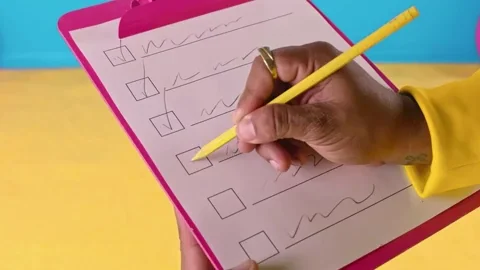
This logo isn't an ad or affiliate link. It's an organization that shares in our mission, and empowered the authors to share their insights in Byte form.
Rumie vets Bytes for compliance with our
Standards.
The organization is responsible for the completeness and reliability of the content.
Learn more
about how Rumie works with partners.
The first week of the semester is over, and it's time to PARTY!

You receive a text invite to go to a party at a classmate's house that evening.
You arrive at the party and notice there are a LOT of people there!
Suddenly, someone comes towards you and tries to strike up a conversation. Unfortunately, instead of answering, you don't know what to say!

That's awkward...
Luckily, the F.O.R.D method has four steps that can help you navigate these social situations, making you an expert with small talk!
F = Family
If you're stuck on what to say or how to keep the conversation going, start with what you know: your family.

Talking and asking about family is a great way to make a connection and start a conversation. It's universal and can encompass different relationships, including friends, pets, and partners.
Some Questions You Can Ask:
How many siblings do you have?
How old is your child?
Do you have family in the area?
How is your [mother, father, sister] doing?
 Careful! Don't assume that everyone has a positive family situation. Don't be too nosy!
Careful! Don't assume that everyone has a positive family situation. Don't be too nosy!
Quiz
You've just met a new acquaintance at a party, and you're talking about your families. Which questions would NOT be appropriate to ask?
While the intention of these questions may be to show curiosity, they may not be received the same way. Be careful with how you ask about family matters so as not to offend.
O = Occupation
Another way to connect with people is to talk about what they do for a living. Depending on the event, you can use this type of question for networking or to explore career opportunities you may have never thought of before!

Some Questions You Can Ask:
What do you do for a living?
How do you like working at __________?
What are you majoring in?
What are you hoping to do after graduating later this year?
 Careful! Some people may not feel comfortable answering questions about how much money they make and the companies they work (or want to work) for.
Careful! Some people may not feel comfortable answering questions about how much money they make and the companies they work (or want to work) for.
Quiz
You're at a networking event, and you're having a conversation with someone who works at a local business. What questions are NOT appropriate to ask?
Be careful with how you ask questions about someone's occupation. You don't want to appear to be accusatory or judgmental about someone's occupational choices.
R = Recreation
Besides your family and professional goals, another great topic to talk about is recreation. Recreation refers to hobbies or interests you like to do for fun.

Some Questions You Can Ask:
What do you like to do for fun?
Have you seen [that movie]?
What clubs do you suggest I join on campus?
 Careful! Be cautious with how you respond to other people's interests. Avoid being negative or rude about people's hobbies if they're not hobbies you're interested in. You're trying to show interest in the person and what they have to say.
Careful! Be cautious with how you respond to other people's interests. Avoid being negative or rude about people's hobbies if they're not hobbies you're interested in. You're trying to show interest in the person and what they have to say.
D = Dreams
Everyone has hopes and dreams. Why not share them and learn more about each other's goals and ambitions? These kinds of questions are considered deeper than the other three topics, and some people think these are the most fun questions to ask since they are open-ended.

Some Questions You Can Ask:
What would you like to be if money weren't an issue?
What do you hope to do after you graduate?
Where would you like to travel?
Would you ever consider trying [sample activity]?

Caution! Avoid making disparaging remarks or ridiculing their hopes and dreams. Everyone has different goals they want to accomplish in life.
Scenario: Put the F.O.R.D Method Into Action!
Read the scenario below and choose the correct answer based on what you learned above.
 You're at a networking party, and you meet Janine. Janine is 25 years old, works as a software engineer at a local company, and graduated from the same school you attend. What are some possible questions you can ask Janine to get the conversation going?
You're at a networking party, and you meet Janine. Janine is 25 years old, works as a software engineer at a local company, and graduated from the same school you attend. What are some possible questions you can ask Janine to get the conversation going?
A: What do you think about the other people at this party?
B: How long have you been working as a software engineer?
C: What kinds of activities were you involved in at school?
D: Why are you working as a software engineer? Isn't that boring?
Quiz
What are some possible conversation questions you can ask Janine?
These questions can help you learn more about Janine and her network. The other questions may not be appropriate for this kind of setting.
Take Action
Now that you know more about the F.O.R.D method, take these steps before your next event or social situation:

This Byte has been authored by
Suzanne Bardasz
Instructional Designer